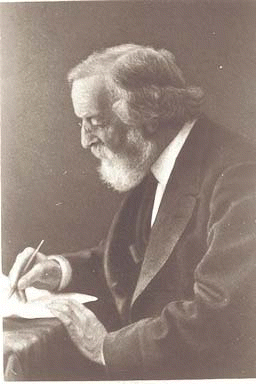|
|
Chapter 4: American Transcendentalism
James Freeman Clarke
|
|
Page Links: | Selected Bibliography | MLA Style Citation of this Web Page |
Site Links: | Chap 4: Index | Alphabetical List | Table Of Contents | Home Page |

|
|
Chapter 4: American Transcendentalism
James Freeman Clarke
|
|

Primary Work
The Letters of James Freeman Clarke to Margaret Fuller. Ed. Wesley J. Thomas. Hamburg, Germany: Cram de Gruyter, 1957.
Bolster, Arthur S., Jr. James Freeman Clarke: Disciple to Advancing Truth. Boston, 1955.
Clarke, James Freeman. Ten Great Religions: An Essay in Comparative Theology, 1899. BL80 .C5
Hodder, Alan D. "James Freeman Clarke." in Mott, Wesley T. ed. The American Renaissance in New England. Detroit: Thomson Gale, 2001.
Myerson, Joel. ed. The Transcendentalists: A Review of Research and Criticism. NY: Mod. Lang. Assn. of America, 1984.
Rathbun, John W. and Monica M. Grecu. eds. American Literary Critics and Scholars, 1800-1850. Detroit: Gale, 1987.
Thomas, Wesley J. James Freeman Clarke Apostle of German Culture to America. Boston: John W. Luce & Company Publishers, 1949.
A Student Project by Melanie Moore
James Freeman Clarke was born on April 4, 1810 in New Hampshire. At age 10 he went to Boston Latin school where after a short struggle he began to excel. In 1825 Clarke entered Harvard College, he was 15. He became friends with William Henry Channing during his school years at Harvard. In his last year at Harvard he became friends with Sarah Margret Fuller and was learning from men such as Coleridge and Carlyle..
After Harvard, Clarke enrolled in Divinity School at Cambridge. He was unhappy there in his first year. He left the school in 1830 after his first year because of financial difficulties. Clarke returned to Divinity School the next year. He and Margret Fuller decided to study German together. Throughout his life Margret Fuller was a companion and an inspiration to Clarke. They corresponded and studied together. In July 1833 Clarke finished school at Divinity and was ordained on July 21.
Clarke went west to Kentucky to preach and felt he might have to give up his philosophy and perhaps intellectualism all together. Clarke met other individuals interested in the same literature as himself and went on with his philosophy . These individuals such as: James Perkins, Ephraim Peabody, Edward Cranch and William Elliot all became contributors to the first Transcendental Journal, called The Western Messenger.
Clarke was also a member of the "Transcendental Club" which began in 1836 and sporadically existed until 1848. Two years after joining this club, on August 15, 1839 Clarke married Anna Huidekoper (Margret Fuller was very jealous) and had 4 children(119 Bolster).
Clarke , unlike the other members of the "Transcendental Club" did not join Brook Farm. He did, however, purchase Brook Farm in 1885 hoping to start another social and literary society which also failed.
Clarke preached throughout his life and lived well into his eighties. He tried politics as a way of making the world better as well as his philosophy and preaching. He died peacefully with his youngest child and his wife at his bedside.
Clarke's main works include: 32 books mainly concerning theology, almost 50 sermons and essays, and 25 published tracts in the American Unitarian Association series. He was editor to various publications such as The Western Messenger and Christian World. Clarke also contributed to many other periodicals (364 Bolster).
Works Cited
Thomas, Wesley John. James Freeman Clarke Apostle of German Culture to America. Boston: John W. Luce & Company Publishers, 1949.
Bolster, Arthur S. Jr. James Freeman Clarke Disciple to Advancing Truth. Boston: The Beacon Press, 1954.
MLA Style Citation of this Web Page:
Reuben, Paul P. "Chapter 4: James Freeman Clarke." PAL: Perspectives in American Literature- A Research and Reference Guide. WWW URL: http://www.paulreuben.website/pal/chap4/clarke.html (provide page date or date of your login).| Top |